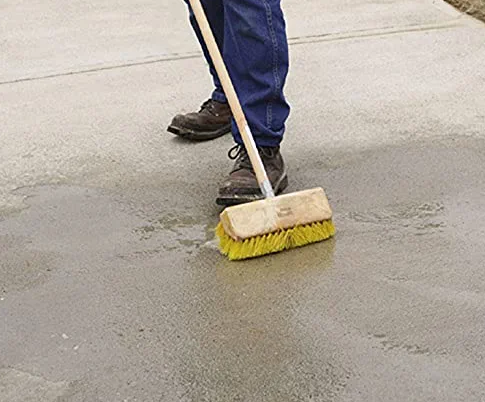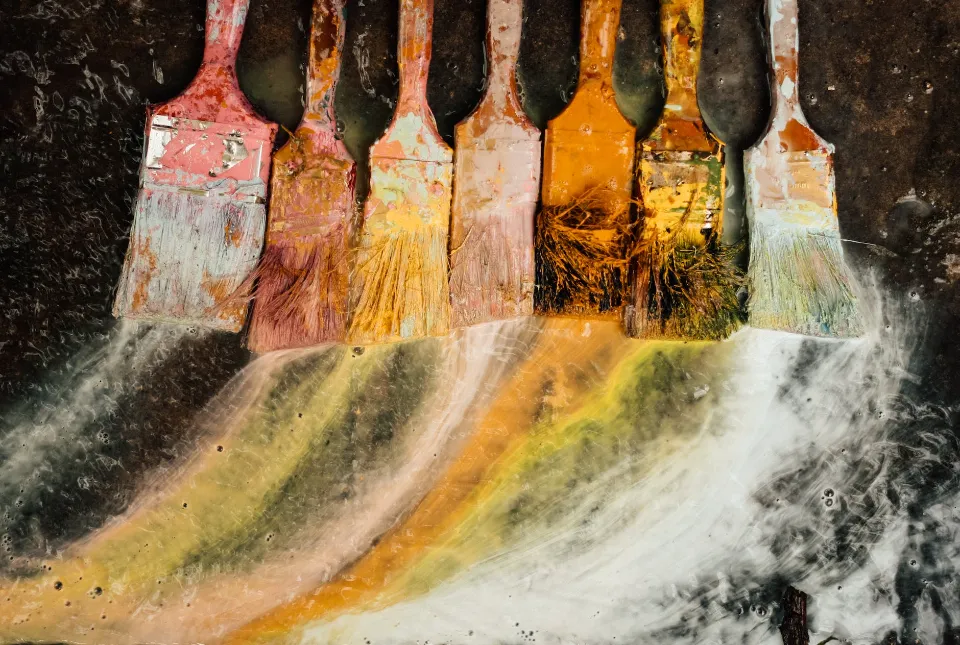If you feel comfortable using powdered concrete cleaners, you can choose the Zep concrete cleaner if you need to clean a sizable area. The RMR-86 concrete cleaner is made for bathrooms, kitchens, and other similar places. Continue reading, you will learn more concrete cleaners based on different needs, and you will learn how to choose the best concrete cleaner for yourself.
Table of Contents
Best Concrete Cleaner List
- BEST OVERALL: Zep Neutral pH Floor Cleaner Concentrate ZUNEUT128
- BEST ECO-FRIENDLY: ACT Concrete Cleaner
- BEST DEGREASER: Oil Eater Cleaner Degreaser
- BEST FOR PRESSURE WASHING: Simple Green Oxy Solve Total Pressure Washer Cleaner
- BEST FOR MOLD AND MILDEW: RMR-86 Instant Mold and Mildew Stain Remover Spray
- BEST BANG FOR THE BUCK: Sunnyside 64216 TSP All-Purpose Cleaner
- BEST WATERLESS: CAF Outdoor Cleaning EXIMO Waterless Concrete Cleaner
What is the Best Concrete Cleaner?
The following concrete cleaners were chosen based on the previously mentioned criteria. They are regarded as some of the best cleaners to remove the toughest stains, such as oil stains on the driveway, paint stains on the garage floor, and mildew on the foundation.
Zep Neutral PH Floor Cleaner Concentrate ZUNEUT128

Zep Neutral pH Floor Cleaner Concentrate is an excellent option for sealed concrete floors, as well as marble, granite, vinyl, and stone (do not use wood floors). The formula’s neutral pH helps keep the floor polished without removing the barrier coat. It eliminates dirt and revives shine without rinsing.
It takes up less storage space because this concentrated formula can produce up to 128 gallons of cleaning solution. For better maneuverability and more effective cleaning without leaving a residue, Zep advises using a microfiber mop with this product as opposed to a conventional string mop.
Product Specs
- Compatible Stains: Unlisted
- Cleaner Type: pH-neutral cleaner
- Liquid/Dry: Liquid
- Working Time: Immediate
Pros
- Can make 128 gallons of cleaning solution
- Suitable for concrete, marble, granite, vinyl, and stone
- No rinsing required
Cons
- Restores shine; may not be suitable for very stubborn stains
- Not suitable for use on wood or unsealed concrete floors
- Recommended for use with a microfiber mop
ACT Concrete Cleaner

Without scrubbing, ACT Concrete Cleaner removes oil, grease, antifreeze, gum, animal feces, and mold stains from concrete, pavers, wood, soil, plastic, and other surfaces. Proteins and petroleum hydrocarbons are broken down and bioremediation using the same efficient processes used by the oil and gas industry and commercial warehouses (paint is not removed). Carbon dioxide and water are produced during the staining process.
You need only apply the dry cleaner to the stained area, rub it into the stain with a broom or brush, and then wait three to four weeks to see the full effects. This product is safe to use around people, animals, and plants while also being environmentally friendly.
Product Specs
- Compatible Stains: Oil, grease, antifreeze, gum, animal waste, and mold stains
- Cleaner Type: Enzyme
- Liquid/Dry: Dry
- Working Time: 3 to 4 weeks
Pros
- Safe for homes with children and pets
- Removes bioremediate petroleum hydrocarbons and proteins
- Works on concrete, pavers, wood, soil, plastic, and more
- USDA-certified
Cons
- Should not be rinsed off after use
- May take some elbow grease upon application
Oil Eater Cleaner Degreaser

Grease and oil on most surfaces can be safely removed with Oil Eater Cleaner Degreaser. It is USDA approved for nonfood surfaces and is nonacidic, noncorrosive, nonhazardous, free of abrasives, and contains no petroleum solvents. The concentrated water-based, biodegradable product can be used as a light, medium, or heavy-duty degreaser by dilution according to the label’s instructions.
It can be used on a variety of surfaces in addition to removing grease and oil stains from concrete, including household floors, carpets, tubs and tile, grills, decks, stoves, boat hulls, tires, siding, and asphalt.
Product Specs
- Compatible Stains: Grease and oil
- Cleaner Type: Water-based
- Liquid/Dry: Liquid
- Working Time: Immediate
Pros
- Biodegradable formula
- Suitable for indoor and outdoor use
- Concentrated formula
- Works as a light-, medium-, and heavy-duty degreaser
- USDA approved
Cons
- Some users report poor oil stain removal
Simple Green Oxy Solve Total Pressure Washer Cleaner

Use Simple Green Oxy Solve Total Pressure Washer Cleaner as a pretreatment prior to pressure washing to weaken the bond of stains to concrete, or use it in the pressure washer’s cleaning solution reservoir for one-step cleaning. To thoroughly remove dirt, grime, mold, mildew, moss, and algae stains, this cleaner uses the peroxide’s cleaning power.
The biodegradable remedy satisfies U.S. standards. Safe for use around pets, garden plants, and wildlife, the Environmental Protection Agency’s Safer Choice Program. It is appropriate for concrete as well as a variety of other materials, such as wood, composite, vinyl, metal, fabric, plastic, wicker, stone, brick, and asphalt. Use it for a variety of things, including siding, foundations, and driveways.
Product Specs
- Compatible Stains: Dirt, grime, mold, mildew, moss, and algae stains
- Cleaner Type: Peroxide
- Liquid/Dry: Liquid
- Working Time: 3 to 5 minutes
Pros
- Biodegradable formula
- accepted by the United States Environmental Protection Agency’s Safer Choice Program
- Safe for wood, composite, vinyl, metal, fabric, plastic, wicker, stone, brick, and asphalt
- Can be used in a pressure washer’s reservoir
- Affordable
Cons
- Some users report a strong chemical smell while using
RMR-86 Instant Mold and Mildew Stain Remover Spray

A fast-acting spray called RMR-86 Instant Mold and Mildew Stain Remover uses pure sodium hypochlorite and deep-penetrating surfactants to get rid of tough stains. Surfactants break down the bond between the soil and the concrete’s surface, and sodium hypochlorite’s potent bleaching abilities instantly eradicate mold and mildew on contact.
This strong cleaner is available as a ready-to-use, sprayable solution and is capable of dissolving mold and mildew stains in a matter of seconds without the need for scrubbing. It is safe to use on decks, wood, vinyl siding, drywall, concrete floors, brick walls, kitchen and bathroom tiles, bathtubs, and other places where mold and mildew thrive.
Product Specs
- Compatible Stains: Mold and mildew
- Cleaner Type: Sodium hypochlorite
- Liquid/Dry: Liquid
- Working Time: Immediate
Pros
- Professional-grade cleaner
- Fast-acting
- Bleaching effect
- Suitable for concrete, wood, brick, plywood, and drywall
Cons
- Should not come in contact with metals
Sunnyside 64216 TSP All-Purpose Cleaner

Trisodium phosphate, a potent alkaline cleaner, degreaser, and paint remover safe for concrete surfaces, is the main component of Sunnyside TSP All Purpose Cleaner. It can effectively remove dirt, grease, mildew, and soap scum from a variety of soiled surfaces and is roughly one-third less expensive than many other cleaners. Preparing concrete surfaces for paint is a wise decision as well.
For a potent cleaning solution, combine between ¼ and ½ cups of this powdered concentrate with a gallon of hot water. Since TSP has a high phosphate content and can cause problems if it leaks into streams and other water sources, it is best used indoors, such as in basements and garages. TSP is highly alkaline and can result in serious skin burns or irritation, so use caution and protection when mixing and using it.
Product Specs
- Compatible Stains: Dirt, grease, mildew, and soap scum
- Cleaner Type: Alkaline
- Liquid/Dry: Liquid
- Working Time: Immediate
Pros
- Heavy-duty; trisodium phosphate-based cleaner
- Suitable for preparing concrete for painting
- Can create hundreds of gallons of cleaning solution
Cons
- Suitable for indoor concrete floors only
- Can cause irritation or burns
CAF Outdoor Cleaning EXIMO Waterless Concrete Cleaner

EXIMO Waterless Concrete Cleaner removes stains on concrete from gasoline, diesel, oil, grease, petroleum-based products, and more by utilizing microbes that break down the hydrocarbon chains in oil. It is a potent, naturally occurring, waterless cleaner that is natural, safe for the environment, and extremely effective against stains while being completely safe for nearby grass and plants, as well as for people and pets. Parking lots, sidewalks, concrete patios, stairs, pavers, and other comparable surfaces can all use, whether they are wet or dry.
With a broom, apply the solution, working it into the stain; do not sweep it up or wash it away. To completely remove a stain, apply once per week for four weeks. Living microbes in the cleaner follow stains and spills deeply below the surface, ingesting petroleum through minuscule cracks in the concrete and even into the subsoil below.
Product Specs
- Compatible Stains: Gas, diesel, oil, grease, and petroleum-based materials
- Cleaner Type: Microbes
- Liquid/Dry: Dry
- Working Time: 4 weeks
Pros
- Can be applied wet or dry
- Natural and eco-friendly
- Suitable for many outdoor surfaces
- Affordable
Cons
- May take some elbow grease to apply
- Takes some time to clean
What to Consider When Choosing Concrete Cleaner?
You might be interested in learning how various types of stains are removed by the various concrete cleaners since there are so many to pick from. Discover how stains are categorized, which cleaners remove the various types of stains and other helpful hints in the paragraphs that follow to help you choose the best concrete cleaner for your project.
Cleaner Type
Be mindful that different cleaners act to remove stains in different ways and respond to the concrete surface in various ways when selecting an appropriate concrete cleaner. To chemically lift stains, cleaners can use formulas that are pH neutral, alkaline, or acidic. Since concrete is made of alkaline lime, the surface needs to be neutralized after using an acid cleaner. Chemical pollutants are digested or converted into inert substances by enzyme and bacterial-based cleaners.
- pH-neutral cleaners are often used to clean sealed concrete surfaces indoors without embedded dirt. If the concrete only requires a light cleaning, they can also be used on unsealed concrete both inside and outside.
- The alkaline concrete cleaner is a powerful degreaser designed to remove burned oil, tar, soot, grease, and other petroleum-based stains.
- The acid concrete cleaner is made with hydrochloric acid or phosphoric acid that reacts with the concrete surface. It is used to get rid of scaly mineral salt buildup, efflorescence, and hard water stains.
- Enzyme cleaners come in different formulations that attack, break down, and in some cases digest hydrocarbon, starch, or protein-based stains. These cleaners use genetically modified bacteria that feed on grease and oil.
Concentration and Form

Concrete cleaners are available in dry or liquid applications. For removing biological or mineral stains, liquid concrete cleaners are typically used. Generally speaking, they are chemical-based cleaners, though some might be enzyme-based. When compared to concentrates, which must be diluted with water before use, ready-to-use formulations are quick and convenient but concentrates are frequently more expensive.
Dry concrete cleaners are designed to remove hydrocarbon stains from concrete’s surface and soak up liquids. Cleaners for bacteria are applied dry. When the microbes come in contact with hydrocarbons, they become active and begin to slowly eat away at the stain’s leftovers until they are gone.
Stain Type
Living organisms like moss, algae, and mold are the culprits behind biological stains. On concrete surfaces that are constantly damp, they frequently manifest as green streaks, films, or cushiony growth over a large area. In humid environments, this issue may recur, so having a quick-acting, the long-lasting fix is beneficial. Commercial cleaners work faster, and more thoroughly, and can help prevent regrowth. Home remedies like scrubbing with bleach or white vinegar are frequently advised.
Unattractive concrete stains can also be caused by spills and leaks of hydrocarbons, which include petroleum products like motor oil, cleaners, paint, and solvents. These substances seep into the porous concrete surface, causing discoloration and, in some cases, chemical reactions that could physically deteriorate the concrete surface. Make sure to select a cleaner that is advised for use on the specific spilled substance: enzyme cleaners can neutralize many volatile compounds, reducing their detrimental effects on the environment, and absorbent cleaners can remove the spilled substance from concrete.
Working Time
There is no set amount of time for cleaning; it could take a minute or several weeks. While it is relatively simple to remove and kill biological stains like algae and mold, doing so with an enzyme or bacterial cleaner can take a while for deeply embedded hydrocarbon stains. As was previously mentioned, the product’s functionality accounts for the majority of the difference in working time.
Petroleum is broken down by bacteria more slowly than by chemical processes, such as the separation of grease from concrete by an alkaline cleaner. However, there is a cost to using a fast-acting cleaner, as opposed to bacterial treatment, which breaks down petroleum pollutants into water and carbon dioxide.
Safety
Depending on the type of spill or stain being cleaned, as well as the product itself, the environmental impact of concrete cleaning products varies. Instead of releasing toxins into the environment, care should always be taken to remove and properly dispose of them.
Pressure washing is efficient and secure for use on biological stains when combined with eco-friendly cleaners because it disperses debris from the concrete surface into the surrounding environment. When possible, it is ideal to use enzyme- or bacteria-based cleaners to remove potential environmental pollutants like oil or gas.

Concrete cleaners carry inherent risks for skin contact, ingestion, inhalation, and other unintentional exposure even though they are safe when stored and used correctly. Store these items in a location that is out of children’s and animals’ reach. Never place them in a container without markings. Always follow the manufacturer’s recommendations for safe use, including those regarding the use of personal protective equipment, secure storage, and emergency first aid.
Cleaning Method
Cleaning procedures also vary because there are so many different cleaning products. No matter what product you use, make sure to read and abide by all safety, application, cleanup, and disposal instructions.
- Many of the concentrated liquid products are well suited for use as a pretreatment before pressure washing. While you can use these products without a pressure washer, thorough cleaning would require a good scrub with a stiff bristle brush, followed by a thorough rinse. A wash solution made of ½ cup of baking soda and 1 quart of water must be used to neutralize the concrete surface after using an acid-based cleaner. This is done before giving the concrete a good rinse with clean water.
- Dry-product cleaning methods vary as well. Absorbent and enzyme cleaners typically finish the job in a few hours; afterward, they are swept up and reapplied as necessary. Bacteria-based cleaners should be used indefinitely because it may take a few weeks for the microbes to fully colonize the area.
FAQs About Best Concrete Cleaner
Are Concrete Cleaners Harmful to Pets?
When using concrete cleaner, keep all animals and kids away from the area, and store the supplies out of their reach. The area is immediately safe for everyday use after cleaning.
What Do You Spray on Concrete before Pressure Washing?
If the surface is pretreated with a concrete cleaner, the pressure-washing process will be simpler and more effective. Before pressure washing, use low pressure to apply the cleaner and let it sit for three to five minutes.
What Can I Use to Clean a Concrete Driveway?
Use a bioremediation cleaner to eliminate oil stains and other hydrocarbons. Use a contractor-grade hypochlorite-based cleaner to spot-clean any stubborn algae or moss growth. Clean thoroughly and get rid of efflorescence using an acid cleaner. A pressure washing cleaner will work well for the general cleaning of a dirty driveway.
Will Rust Come Off Concrete?
Concrete rust stains must be removed with a specialized acidic cleaner.
Conclusion on Best Concrete Cleaner
The Zep Neutral pH concentrate is a good option for cleaning concrete, marble, granite, vinyl, and stone. This top pick not only starts cleaning right away, but it also comes with enough product for over 128 gallons of cleaning solution and needs no rinsing after use. As an affordable alternative, the alkaline-based Sunnyside all-purpose cleaner is suitable for interior cleaning and contains enough product to handle hundreds of stains and cleanings.





